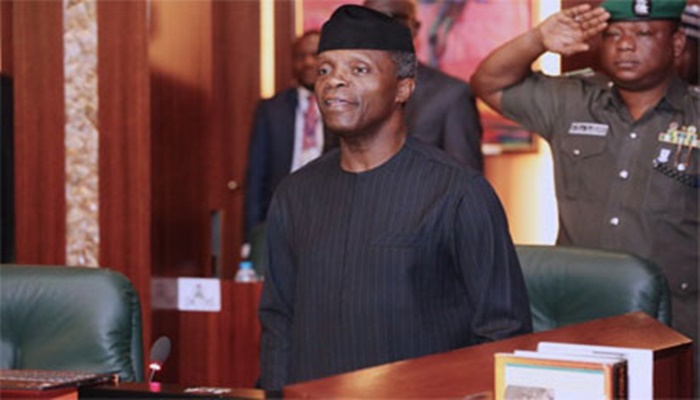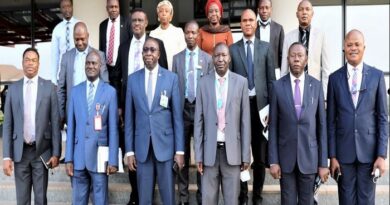FG will end atrocities of SARS, Osinbajo assures
The Federal Government will end the many reported atrocities said to be committed by operatives of the Special Anti-Robbery Squad (SARS) unit, according to Vice President, Yemi Osinbajo, SAN.
Prof. Osinbajo stated this while fielding questions from young Nigerians at a Town-hall meeting, on the side-line of the launch of the National Micro, Small and Medium Enterprises (MSMEs) Clinics in Ibadan on Tuesday evening.
He stated that the Federal Government’s commitment to addressing the concerns raised about SARS operations is reflected in President Buhari’s directive for an immediate review and restructuring of the unit.
According to the Vice President, “Many people are complaining about the atrocities of SARS, people are saying there should be no more SARS. SARS as you know is anti-robbery squad but several members of the squad have gone rogue and are doing things that are contrary to the very reasons for which they were set up.
“But it is not enough to just say, ‘end SARS’. You know it is an anti-robbery squad. What we need to end is to deal with the atrocities of SARS, we want to end everything that is wrong that they are doing and we must always have in place, a force that is able to protect us against robbery, against kidnapping and all that.
“The President has already ordered a review of the formation of SARS so that very soon we would be able to have SARS that will be responsible.”
Speaking on measures to address the power challenge in Nigeria, the Vice President said, “we have a systematic approach to the power solution in the country, but the approach is not to rely on the regular power supply.”
He explained that “the country is too large to have the same power sources that we have had for so many years and that is the reason we are decentralizing all our power sources and we are now getting off grid power.”
The Vice President added that though “we have increased our power generation capacity from about 3000 since 2015 to about 7000 MW, the current situation with power is that it has been privatized and the privatization was not done particularly well.
According to him, “the responsibility has fallen on the Federal Government and we are doing just that but the approach is not to rely on the regular power supply. We don’t want to have all our power come from the same sources that is why we are trying to decentralize power generation and distribution in Nigeria.
“We have also done something that is called the Eligible Customer Declaration which means that industrial hubs or estates can buy their own power so we don’t have to rely on the grid. So there are now companies that are licensed to provide power to estates, to provide power for industries on willing-buyer, willing-seller basis.”
Responding to questions on the promises made by the APC government in 2015, Prof. Osinbajo said the Federal Government is on track as it is delivering on a number of promises.
On improved food production, the Vice President said, “Our major priority is to be self-sufficient in food production, not just to produce it, but to produce it cheaply”.
“When we got into office, we were importing rice at $5 million every single day. Today, we are importing only 2% of our rice and we are able to do so because we funded agriculture through the Anchor Borrower programme. In another year we may not need to import any single grain of rice.
“This is the same with tomato paste. We are going to become self-sufficient in tomato paste; we are going to become self-sufficient in sorghum, millet and in several other types of grain,” the Vice President added.
On unemployment, Prof. Osinbajo stated that “our own position is that you can attack unemployment in several ways, and we are attacking it in several different ways.”
According to him, “the first way is by providing an opportunity for a person who comes out of school and that is the N-power program. We have 200,000 of such young people in every local government and we are engaging by next month, another 300,000 so we are going to provide 500,000 N-Power jobs.
“The second is to make credit available to those who want to do business and we have a scheme called GEEP, Which is Government Enterprises Empowerment Scheme. It’s a micro credit scheme. At the moment we’ve given about 300,000 but in the next few months we are expanding that scheme to bring several others and I think by then it will be about a million.”
He added that the establishment of technology hubs across the country in collaboration with the private sector is also geared towards empowering young Nigerians to create employment.
He said: “One of the things that we have been doing over a year now is encouraging technology across the country and we have started establishing hubs.
“We are doing a technology hub at the University of Lagos; we have one in Yola, another in Benin. We are also collaborating with several of the different private sector hubs that by the time we are done, we would have about between six and eight of these technology hubs.”




